2022 Environmental Merit Award Recipients
- A Letter from EPA's Regional Administrator
- Ira Leighton "In Service to States"
- Lifetime Achievement
- Individual
- Government
- Environmental, Community, Academia & Nonprofit
- Business
A Letter from EPA's Regional Administrator
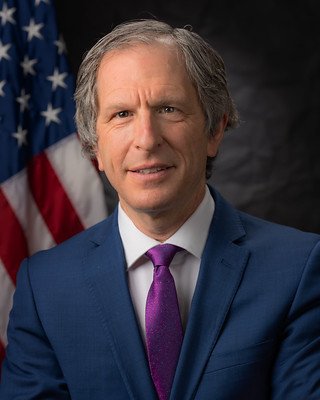
It is my greatest pleasure to congratulate the recipients of the EPA Region 1's Environmental Merit Awards for 2022. Your work has left an indelible mark protecting and improving the environment and public health for the people of New England.
Since beginning my position as Regional Administrator, I have been inspired by community efforts that dovetail with and advance EPA's mission. The collective work of this year's award winners represents contributions in addressing climate change, furthering environmental justice, and restoring contaminated land, as well as minimizing exposure to harmful substances. Because of your efforts, New Englanders have healthier air to breathe and cleaner water to drink.
Our pool of nominees and recipients this year celebrate people who are nothing short of impressive. From scientists to community leaders to government officials, your commitment to tackling some of our region's most serious environmental challenges is worthy of recognition. I am proud to congratulate you as recipients of EPA's Environmental Merit Award. I want to personally thank you for your commitment to furthering EPA's mission in protecting human health and the environment. We respect and honor the work you do, which will no doubt inspire future generations to follow in your footsteps.
Sincerely,
David W. Cash
Regional Administrator, EPA Region 1
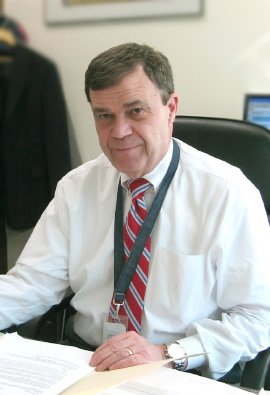
1945-2013
Dedicated EPA public servant since 1972.
A true friend, a mentor and a lover of New England. He is missed.
Ira Leighton "In Service to States" Annual Award
The Ira Leighton "In Service to States" Environmental Merit Award is a tribute to our long-time colleague and friend, Ira Leighton, who passed away in 2013, after serving 41 years at the U.S. EPA. Ira's dedication and passion for protecting the environment was evident to all who knew him. He was a constant presence in New England, a force who took ideas and made them actionable tasks that resulted in measurable improvements.
Initiated by:
- New England Interstate Water Pollution Control Commission (NEIWPCC)
- Northeast States for Coordinated Air Use Management (NESCAUM)
- Northeast Waste Management Officials' Association (NEWMOA)
- New England State Environmental Commissioners
- U.S. Environmental Protection Agency, Region 1 (EPA)
Saluting the Ira Leighton "In Service to States" Annual Award Recipient

Melanie Loyzim
Maine Department of Environmental Protection
Melanie Loyzim, commissioner of the Maine Department of Environmental Protection, has been a leader over the past two decades in promoting environmental protection and maintaining a viable economy.
Melanie spent most of her career at state agencies, beginning in Colorado. In 2006, she started in the Oil Enforcement Unit of the Bureau of Remediation and Waste Management at Maine's DEP. Since then, Melanie has risen from supervisor in the Air Bureau to director for the Bureau of Air Quality, then director for the Bureau of Remediation and Waste Management, and finally deputy commissioner, before becoming commissioner last year.
Melanie has supported staff efforts that contributed to a broader multi-state understanding of air pollution, with an emphasis on ground-level ozone and regional haze trends. These insights, for states from Virginia to Maine, provided a record of the success of regional air pollution control programs, and inform future efforts for clean air progress.
Melanie also participated in the Northeast States for Coordinated Air Use Management, working with air director colleagues to improve air quality regionally. This included efforts such as putting in place California low emissions vehicle standards in the states that adopted the program, including Maine. She continues to participate in regional air quality issues as an officer of the Ozone Transport Commission
As director for the Bureau of Remediation and Waste Management, Melanie was a board director for the Northeast Waste Management Officials' Association, where she worked with colleagues in other nearby states on issues relating to hazardous waste, petroleum and other cleanup sites, brownfields, materials management, product stewardship, pollution prevention, emerging contaminants, and toxics in products.
Under Melanie's leadership, Maine is embarking on a PFAS soil and water investigation resulting from applying biosolids. This massive effort is leading the nation to better understand the links between PFAS, application of biosolids, and impacts to agriculture.
Melanie deserves this award thanks to her leadership in multiple program areas, and her thinking of practical solutions that help people, the economy, and the environment.
Lifetime Achievement

Judith Swift, URI Coastal Institute
Narragansett, Rhode Island
Judith Swift, retiring director of the University of Rhode Island Coastal Institute, is a leader dedicated to interdisciplinary collaboration, science communication, and creative solutions for helping ecosystems across New England.
Among the initiatives she has led were the North Atlantic Coast Cooperative Ecosystem Studies Unit, a consortium of federal partners, universities, and nonprofit organizations; a network, allowing the use of URI personnel and resources for environmental emergencies; a state coastal and ocean magazine, where she was writer, editor, and co-publisher; a report analyzing 13 sectors in the Narragansett Bay watershed relying on natural capital; and a federal program addressing the threat of PFAS to human health.
Judith's contributions to the bi-state Narragansett Bay Estuary Program span many years. Over a decade ago, she recognized the struggles, as well as the untapped potential, of the bi-state estuary program. With support from EPA, Judith made changes that improved the program's reputation at local, state, and federal levels. Guided by historical perspective and an understanding of the parties involved, Judith steered the program through a lengthy process that led to a scientific report called, "The State of Narragansett Bay and Its Watershed." She led a conference to fulfill the plans laid out by consolidating under one host organization, improving relationships between Rhode Island and Massachusetts, emphasizing science, enhancing partnerships, aligning the budget, prioritizing staffing, and strengthening the governance structure.
As chair of the program's steering and executive committees, Judith served with perseverance and dedication. She devoted countless hours to discussions with the former host, the New England Interstate Water Pollution Control Commission, to reinvigorate the program.
Judith's belief in partnerships made her service to the states vital. Her role as chair ended in 2019, but she continues to serve the region with commitment to the interconnected ecosystem and indirectly through the work of her successors, students, and mentees, some of whom she never knew she motivated.

Lynn Rubinstein, Northeast Recycling Council
Brattleboro, Vermont
After four decades dedicated to resource conservation, Lynn Rubinstein will retire this year, leaving behind a legacy of work that will have a lasting impact.
For over 20 years, Lynn was executive director of the Northeast Recycling Council, a nonprofit focused on reducing waste, recycling and composting, as well as on environmentally preferable purchasing and decreasing the toxicity of solid waste.
The council received many awards as Lynn expanded its reach by getting the participation of more players and putting in place more than 100 projects. Among the projects were efforts to recycle electronics; manage unwanted medication; document the relationship of jobs to recycling; and inspire initiatives for recycling newsprint.
Lynn has been a trusted voice for the private recycling industry and government, fostering an environment where industry and government can discuss common issues and find solutions. She co-founded many programs including the State Electronics Challenge, Electronics Recycling Coordination Clearinghouse, and Government Recycling Demand Champions. She also has produced related presentations, whitepapers, and articles, all available on the council's website.
An example of Lynn's commitment to keeping the council dynamic in a changing economy and waste stream, is the partnership she helped form in 2017 between the council and the Northeast Waste Management Officials' Association.
While Lynn is known for her leadership of the Northeast Recycling Council, she also served as solid waste manager for Northampton, conservation director for Holyoke, mercury and electronics recycling program director at the University of Massachusetts, professor of land use management, resource planner, and attorney with the US Department of Justice.
Throughout her career, Lynn pioneered innovative programs, forged connections, and raised the level of regional cooperation across the Northeast. Lynn's work has had substantial impact that will last well into the future.

Betsey C. Wingfield, Connecticut Department of Energy and Environmental Protection
Hartford, Connecticut
Betsey C. Wingfield has been with the Connecticut Department of Energy and Environmental Protection for 34 years, three years as deputy commissioner overseeing air, water, and waste programs. Throughout the decades, Betsey found equitable solutions to environmental challenges, relying on science, innovation, and partnerships.
Early in her career, Betsey helped create the state's first cleanup regulations, shape Connecticut's Brownfields program, and focus state assistance toward environmental justice communities. Betsey led many successful water protection initiatives. She spearheaded a nitrogen-trading program among wastewater treatment plants on Long Island Sound and more than a decade later shaped Connecticut's strategy focusing on upgrades at treatment plants. Betsey also worked on strategies to reduce phosphorus loads to fresh water.
As a member of the Water Planning Council, she and other members pushed to develop the first State Water Plan, which documents mutual goals of water planning entities and sets a path for improvement. Betsey also engaged in the Long Island Study and other initiatives that improved water quality, protected coastal and aquatic resources, and enhanced public access and uses of the sound and coast. Her visions led to the designation of the Connecticut National Estuarine Research Reserve.
Betsey championed many other significant causes, including redevelopment of the Brass Center Mall, the innovative cleanup around the Raymark Superfund site and the development of a PFAS Action Plan.
Serving on the Ozone Transport Commission, Betsey pressed for solutions to address Connecticut's challenges. The state's investment in developing the Geospatial Measurement of Air Pollution that uses advanced monitoring equipment to address previously unknown sources of air pollution is the latest example of a solution Betsey helped find.
Betsey may be best known for her commitment to staff – for setting up a professional development group, establishing a formal mentoring program, personally mentoring future environmental leaders, and leading staff through the COVID pandemic with compassion, and clear communication.
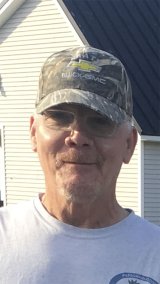
Ed Bassett, Passamaquoddy Tribe – Pleasant Point
Perry, Maine
Ed Bassett of the Passamaquoddy Tribe retired from his job as multimedia specialist for the Passamaquoddy Tribe at Pleasant Point in December, leaving behind a legacy of environmental protection, restoration, and stewardship.
Over 40 years, Ed has served in leadership roles for his Tribe, including Tribal vice chief, Tribal Council member, Tribal game warden, Tribal cultural program director, and Tribal fish and game committee member.
He helped build the capacity of the Tribe's Environmental Program through his management of its General Assistance program for 20 years. Ed advanced environmental protection on Passamaquoddy territory through restoration of tribal lands and waters, with a focus of improving water quality and removing barriers to restoring tribal cultural aquatic species. Ed's expertise in communications helped advance the Tribe's restoration efforts. Through his expertise in digital media technology, he communicated critical environmental issues facing the tribe.
Ed also has devoted significant time to mentoring younger staff and youth. He was director of the Tribe's Camp Waponahki Youth Program, helped with the Wabanaki Wilderness Program, and was assistant director of the Tribal Vocational Education Program. He is also a traditional Passamaquoddy birch back canoe builder, knowledge he passed on. Perhaps Ed's most lasting achievement was co-founding the Schoodic Riverkeepers, with its mission to improve public perceptions of the Indigenous perspective. With a focus on restoring the Schoodic River watershed, the Passamaquoddy name for the St. Croix River, Ed played a crucial role in educating the tribal community and public on the importance of alewife restoration. This led to the opening of the alewife passage at Grand Falls Dam during the spawning season.
Despite retirement, Ed continues to serve by developing a safe, public, watering point for the Tribal community, eliminating the need to travel for drinking water.
Ed's lifetime investment in environmental leadership and cultural preservation will have a lasting impact on Passamaquoddy tribal members.
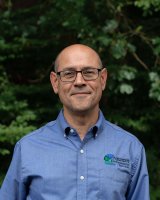
Paul Susca, New Hampshire Department of Environmental Services
Concord, New Hampshire
Paul Susca, who retired in August from the New Hampshire Department of Environmental Services, had a three-decade career in state service that left an indelible mark on state efforts to protect drinking water resources. As an administrator in the state Drinking Water and Groundwater Bureau, Paul oversaw the Source Water Protection Program, the Environmental Lab Accreditation Program, and state private well initiatives, an education program focused on people's relationships with water and compliance and enforcement activities.
Paul's approach to working with other partners has helped "move the needle" when it comes to protecting drinking water. For example, Paul was a founding architect of the Salmon Falls Collaborative, an interstate partnership nationally recognized in 2012 by the Clean Water America Alliance. This collaborative includes EPA, DES, the Maine Drinking Water Program, University of New Hampshire, watershed communities and land trusts, all of which combined resources to protect the Salmon Falls River watershed.
Paul also has been a leader in New Hampshire's effort to conserve water supply lands. In 2017 he began an effort with NH's Drinking Water and Groundwater Trust Fund Commission to create the Source Water Protection Land Grant Program. His involvement was instrumental to commission decisions to allocate over $5.5 million to conserve more than 11,500 acres of critical water supply lands.
Over his career, Paul has led a series of public health-related initiatives, including adoption of a lower arsenic standard. In 2018, the legislature asked DES to determine the economic costs and health benefits of a more stringent standard. Leading the effort, Paul solicited expert opinions from EPA and DES health-risk assessors and contracted health economists to monetize the costs. The findings were pivotal to policymakers' cutting the arsenic standard in half. An effort to reduce state standards below federal standards had never been done before in New Hampshire and Paul's work was central to his receiving DES Employee of the Year award in 2019.

George W. Loomis
Kingston, Rhode Island
George Loomis will retire this fall after 36 years with the University of Rhode Island Cooperative Extension. A soil scientist by training, George dedicated his career to leveraging the latest scientific knowledge to advance the onsite wastewater treatment system field. George literally wrote the book on Onsite Wastewater Treatment: In 2018, he and Jose A. Amador published the book "Soil-Based Wastewater Treatment," with essential information for onsite industry professionals.
Throughout his career George brought together politicians, developers, engineers, land surveyors, septic installers, septage haulers, septic and home inspectors, advanced technology vendors, realtors, and, most importantly, homeowners to change the onsite wastewater treatment industry in Rhode Island.
George was the driving force that moved onsite wastewater in Rhode Island and the region forward by changing the entrenched way of doing business. He was instrumental in building trust among public officials, builders, contractors, realtors, engineers and land surveyors.
As director and creator of the New England Onsite Wastewater Training Program at URI, George trained thousands of professionals. He directed the design and installation of nearly 70 innovative and alternative onsite systems under the auspices of state and federally funded demonstration projects in Rhode Island. He has worked with several communities to develop wastewater management programs as well as ordinances to establish inventories and inspection programs. George was instrumental in developing the RI Septic System Check Up Handbook to standardize the way systems are inspected, which helps protect consumers. George also co-authored the state's sand filter guide, the bottomless sand filter guide, and the pressurized drainfield guide, which have since been integrated into state regulations.
George served on committees at local to national levels, helping establish new regulations and training curricula across the northeastern U.S. and the U.S. Virgin Islands, in line with his commitment to protecting public and environmental health.
George's contributions and impact as an industry leader, teacher, mentor, collaborator, researcher, and advocate for environmental protection are immeasurable.
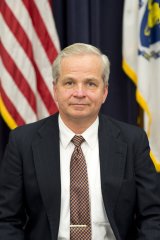
Martin Suuberg
Boston, Massachusetts
Martin Suuberg, commissioner of the Massachusetts Department of Environmental Protection, has more than 30 years of experience in environmental and natural resource agencies at the state and federal level. During that time, he has been effective and innovative in administering environmental laws.
Martin was appointed commissioner in 2015 after serving as undersecretary for environmental affairs in the Executive Office of Energy and Environmental Affairs. As commissioner, he launched a critical investigation into PFAS, which led to setting stringent maximum contaminant levels for PFAS compounds in drinking water and rules for soil and groundwater cleanup. As a leader in climate change efforts, Martin served as president and on the board of the Regional Greenhouse Gas Initiative and promoted the Electric Vehicle Incentive Program to increase charging stations statewide.
Martin championed environmental justice within DEP by diversifying the workforce and by expanding its mission statement to commit to advancing environmental justice. For example, he expanded the network of air monitoring stations in EJ communities to better protect these populations.
Before becoming deputy commissioner for policy and planning, Martin was regional director for the Central Regional Office in Worcester. In 2013, he partnered with Worcester Polytechnic Institute and a regional stormwater coalition, with students helping communities meet EPA stormwater permit requirements. The program has since expanded and coalitions have formed.
While he has a quick grasp of every scientific issue he encounters, Martin is also a lawyer who was general counsel to DEP and to the Executive Office of Environmental Affairs, as well as to the former Department of Environmental Management where he was deputy commissioner. Before moving to Massachusetts, Martin was a lawyer at the U.S. Department of the Interior in Washington, DC, where his work included natural resource damages and endangered species issues.
Martin's leadership has been characterized by diligence, integrity, transparency, and unfailing commitment to public service and environmental protection.

Dr. Jeffrey Underhill
Concord, New Hampshire
Dr. Jeffrey Underhill, chief air quality scientist for 25 years at the NH Department of Environmental Services, retired in July having gained an understanding of regional air quality and transported air pollution that allowed him to develop strategic approaches to reducing emissions and making major improvements in air quality in New Hampshire and beyond. Jeff's doctorate in atmospheric chemistry, masters in atmospheric physics and analytical chemistry and bachelor's in computer science, helped him gain this understanding of air quality.
Jeff provided major scientific support to early efforts of the Ozone Transport Assessment Group, formed by states in the Northeast in 1995 to reduce the transport of ozone from major source emissions into and across the eastern United States.
As chair for the last 15 years of the Ozone Transport Commission Modeling Committee, Jeff has been lead scientist on modeling studies of ozone pollution across the region. These studies influenced EPA to adopt innovative cross-state approaches to reducing transported pollution.
Jeff provided direction for efforts to modernize the state's air monitoring program and helped interpret air quality data and the potential for poor air quality events resulting in public alerts. He is routinely sought by media to explain these alerts.
Jeff has led numerous local air pollution investigations including: studies of particulate matter associated with scrap metal storage and railroad idling; studies of wintertime wood smoke in NH valleys, and studies related to the impacts of sulfur dioxide on communities associated with power plant emissions. Reports on the state's air quality have improved understanding of pollution impacts and health costs. His efforts contributed to New Hampshire's approach to controlling in-state source emissions required to achieve the federal ozone standard, as well as working with the Mid-Atlantic Northeast Visibility Union in addressing the federal Regional Haze standard for reducing suspended particulate matter to restore visibility in the White Mountain National Forest.

Meg Kerr
North Kingston, Rhode Island
Meg Kerr has been staunch advocate for the environmental movement, retiring in 2021 after a successful career of climate leadership and service to the State of Rhode Island.
Raised in Westchester County by parents who were environmentalists even before Earth Day existed, Meg earned her bachelor's degree in marine biology at Brown University. After graduating from Brown University and University of North Carolina, Meg began the early part of her career as a scientist. She worked for the Environmental Protection Agency across North Carolina, Virginia, and Washington, D.C., where she partnered with states to standardize water quality reporting aligned with the Clean Water Act.
She then moved back to Rhode Island and quickly established herself as a prominent advocate for the environment, taking on roles at the Rhode Island Rivers Council, the Narragansett Bay Estuary Program, and Clean Water Action. Meg ended her career as senior director of policy for five years at the Audubon Society of Rhode Island. To add to the list of her accomplishments, Meg was a founder of the Rhode Island Green Infrastructure Coalition and helped launch the Providence Stormwater Innovation Center, a partnership between Audubon and six other organizations.
She also helped found the annual Land and Water Conservation Summit that for over a decade brought together hundreds of environmentalists from the state and region. Meg is passionate about pollinators and organized the Bee Rally at the State House to bring attention to threats faced by bees.
A fierce and respected leader for the environment, and a familiar face at the State House, Meg is also a mother, grandmother and an avid runner, who calls her daily run her "mental thinking time."
Meg's expertise, mentorship, and ability to get things done for Rhode Island's environmental community has made a real mark on the state.
Individual
Brian Byrnes, Providence Parks and Recreation
Providence, Rhode Island
Brian Byrnes, deputy superintendent of Providence Parks and Recreation, is being recognized for his leadership at the Providence Stormwater Innovation Center in Roger Williams Park and his efforts to demonstrate the use of green infrastructure, reduce stormwater impacts and monitor the results of improvements in water quality of the watershed. Brian was instrumental establishing the stormwater center, partnering with the Audubon Society of Rhode Island and other environmental organizations and professionals. He oversaw the installation of many stormwater treatment practices in the park and hosted trainings and webinars that reached many municipal public works staff. The Providence Stormwater Innovation Center monitors the effect of the stormwater practices on water quality downstream and data collected on dissolved oxygen, water temperature, chlorophyll-a, pH, alkalinity, nutrients and bacteria help them better understand the eutrophication process. Cyanobacteria blooms are being monitored in Roger Williams Park ponds with volunteer cyanobacteria monitoring days throughout summer. Smartphone images of algae blooms and of microscopic samples help experts identify the species. Brian has shared his passion and knowledge with other state municipal officials and the Stormwater Design Community. The center showcases nature-based stormwater practices, provides training on green infrastructure, and tests innovative treatment technologies, all to improve urban water quality while beautifying the landscape and creating natural habitat for wildlife.
Sharon Lewis, Connecticut Coalition for Environmental and Economic Justice
Hartford, Connecticut
Sharon Lewis, executive director of the Connecticut Coalition for Environmental and Economic Justice, embodies the best of the environmental movement. Founded in 1998, the statewide coalition includes organizations and constituencies with a shared vision of justice. Their base consists of residents in communities that face systemic problems requiring bold solutions. Under her leadership, the coalition has worked with communities across the state, built up the leadership of leaders of color, and advocated for environmental justice. Over the course of the year, Sharon led dozens of environmental campaigns, including a fight against expanding a landfill and lobbying the Legislature to improve air quality in public schools, electrify transportation, advance clean energy, and act on the climate crisis. As a result of Sharon's work, the state legislature expanded climate and clean energy policies. During the pandemic, she transformed her teaching to allow remote learning. Through over 60 webinars and online discussions attended by over 1,000 people, Sharon helped advocates understand the history of racism exposing communities of color to environmental injustice. In addition, Sharon launched a course in the Boots on the Ground Environmental Advocacy School that brings together environmental justice leaders to develop environmental campaigns and expand organizing capacity. Sharon's leadership expanded access to environmental education and trained a new generation of leaders.
Government
Rhode Island Infrastructure Bank
Providence, Rhode Island
The Rhode Island Infrastructure Bank has been an essential partner in addressing the state's public health and natural environment. Last year, the bank created and supported more than 2,300 jobs and closed $105.9 million in grants and loans, including over $54 million in clean water and drinking water loans. The bank also led the development of Resilient Rhody, a statewide climate resilience strategy that brought together 54 members from state agencies, organizations, and research institutions to come up with 61 recommended actions. In November, the bank released a three-year impact report that showed 100% of municipalities now have active hazard mitigation plans or are updating plans, 20 municipalities have partnered in the Municipal Resilience Program, and $19.5 million in new funding has gone to climate resilience projects. The town of Warren, for instance, received $20 million through the Clean Water State Revolving fund to upgrade its wastewater treatment facility. Also with the bank's help, Newport was able to get more than $49 million through both the Clean Water State Revolving Fund and the Efficient Buildings Fund to make improvements at the Newport Water Pollution Control Plant. The Efficient Buildings Fund allowed for solar panels to be installed that will reduce the amount of energy required to operate the facility.
Kesha Ram-Hinsdale
Montpelier, Vermont
For over a decade, State Senator Kesha has promoted environmental justice. Kesha wrote a bill in 2007 that tied economic and racial justice to environmental justice, which she worked to introduce as a college senior. In 2009 Kesha became the youngest state legislator in the country and the first person of color elected to represent Burlington. After serving as a legislator, Kesha led community engagement efforts that brought together academics, activists, non-profit leaders, and community partners who sought to answer the question, "What does Environmental Justice look like in Vermont?" and to craft policy based on the testimony of those who have been systematically excluded from the mainstream environmental movement. Beginning in 2019, Kesha and her partners in a rural EJ project held conversations in overburdened and underserved communities. As facilitator, Kesha asked about participants' quality of life, and how they wanted the state to respond to environmental and health crises. During the pandemic, the project held 17 virtual conversations with 77 participants, drawing on established relationships with members of the Bhutanese Nepali, Somali Bantu, migrant farmworker, senior, rural, deaf/hard of hearing, disabled, and mobile home communities. This led to Vermont's first ever EJ Policy, which passed this year, and a network of community-liaisons that is a model for community engagement.
Environmental, Community, Academia & Nonprofit
Mark King, Maine Department of Environmental Protection
Mark Hutchinson, University of Maine Cooperative Extension Maine Compost School
Augusta, Maine
The Maine Compost School, the longest continuously running compost program in the country, began in 1997 to tackle the need to divert food waste from landfills. Based at Highmoor Farm, a University of Maine Forest and Experimental Station in Monmouth, it hosts a commercial compost site where students get hands-on learning and field experiences along with traditional classroom activities. Students at the five-day school are from businesses as well as non-profits such as schools and government agencies, or are homeowners. Over 700 participants have come from the US, Canada and 42 other countries. Generally, by diverting wasted food and other organic waste from landfill to composting, methane emissions are significantly reduced and carbon is sequestered. Many composting operations have been established thanks to the Maine Compost School. A few recent Maine small businesses that were formed by compost school graduates and continue to grow include Scrapdogs Compost and Chickadee Compost. In addition, graduates have gone on to manage municipal organics recycling operations such Lamoille Soil in Vermont. The Maine Compost School's mission aligns with the need to promote more composting and promotes innovation to make composting more efficient.
Barnaby Evans and Peter Mello, Waterfire Providence
Providence, Rhode Island
WaterFire Providence has organized recurring river sculptural art events that have brought over 10 million visitors to Rhode Island's capital. Barnaby Evans, founder and executive artistic director of WaterFire and an artist with a degree in environmental science, combines ecological expertise and design philosophy in solutions to public art and urban issues. In 2012, the growing organization bought a vacant industrial building requiring extensive cleanup during renovations. Thanks to Peter Mello, managing director, WaterFire got over $700,000 in state and federal brownfields funding for redevelopment. When unexpected PCB contamination threatened to derail the project, Peter made sure tax credit and bond funding were not jeopardized. The resulting 37,000-square-foot arts center opened in 2017 with its historic beauty intact and sustainable building techniques incorporated, earning an award from the Providence Preservation Society. WaterFire led the city's 2017 Brownfields Areawide Planning project for Woonasquatucket River Valley neighborhoods. Neighboring property owners have since done their own cleanup and renovation projects. WaterFire regularly includes paddling events in its lightings that celebrate the cleaner water and return of fish resulting a sewer improvement project. WaterFire continues to partner with the underrepresented Olneyville/Valley neighborhood. Barnaby and Peter showed that artistic vision, innovative economic strategies, and meaningful community engagement can result in inspiring environmental outcomes.
Massachusetts General Hospital
Boston, Massachusetts
For eight years, Massachusetts General Hospital had a food waste diversion program that has greatly reduced the amount of food sent to a landfill. Six days a week, Agri-Cycle collects organics from the flagship facility that has more than 22,000 employees and houses multiple kitchens and food vendors. MGH was at the forefront of organics programs in Massachusetts, starting its program in 2014, at the start of the state's food waste landfill ban for all generators producing more than a ton of food waste a week Each year the program has grown and been refined. In 2021, MGH diverted 570 tons of food scraps and other compostable items, the most so far. Instead of putting this food in a landfill, MGH sends it to Agri-Cycle's anaerobic digestion process where it is converted to renewable energy. In 2008, MGH set an ambitious goal of reducing energy consumption 25 percent by 2020. Mass General reached that goal in just five years and has now achieved a 36 percent reduction. Other efforts have ranged from major investments in cogeneration, installation of a 40-kW solar array on the roof of the Charlestown Navy Yard parking garage and purchasing energy produced by a wind farm in New Hampshire. MGH is a clear leader in sustainability.
Business
Monadnock Paper Mills, Inc.
Bennington, New Hampshire
Monadnock Paper Mills, a longtime user of EPA's self-reporting environmental impact tools, believes these tools allowed them to track activities and set reduction goals. The company shares its progress and educates other organizations about the value of these programs as it did in its recently published 2020 Corporate Social Responsibility Report. The company is most proud of its increased use of recycled materials, replacing plastic with renewable, fiber-based alternatives. In the past two years the company has commercialized many new products made with 100% post-consumer waste recycled and alternative reclaimed fibers. Over the past three years, it has sold more than 16 million pounds of paper that replace PVC, styrene and vinyl in a broad range of products and markets. All of the company's products are manufactured carbon neutral and it uses 100% Green-e certified renewable wind-powered electricity . The company is a member of the NH Businesses for Social Responsibility and the Sustainable Green Printing Partnership. Most recently, this year it received the Environment Award from the Association of International Metallizers, Coaters and Laminators for its latest product innovation: a high-performance, 100% post-consumer waste recycled fiber paper used for retail gift, loyalty, and membership cards.
Rust-Oleum
Attleboro, Massachusetts
A new industrial participant in composting suggests more unconventional sources are out there. Since 1956, Rust-Oleum in Attleboro has been one of the world's largest refiners of seediac, used to make shellac. Shellac, which comes from the secretions of an insect, is edible and does not release toxins or microplastics. Over 15 months, Rust-Oleum contributed almost a million pounds of this non-toxic waste to composting facilities. Over the last dozen years, the facility had projects aimed at the goals of the Massachusetts Toxics Use Reduction Act, under the direction of Tony Ferri, environmental health and safety manager. Once the company had made its chemical use more efficient, Tony turned to overall resource conservation. Among unavoidable wastes is "Red Mud" a residual consisting of portions of seedlac. Composters were skeptical of this unfamiliar material, so a two-year testing program was put in place. The success of this project suggests that atypical generators of organic wastes should be sought out and that guidance is needed for establishing acceptability. Rust-Oleum's hope is that its example with Red Mud paves the way for other companies to reduce waste to landfills as well as costs, while promoting environmental stewardship in their communities.
GlobalFoundries
Essex, Vermont
The GlobalFoundries Vermont Facility, known as FAB9, manufactures semiconductor chips for global telecommunications and consumer electronics markets. To manufacture semiconductors, energy, water, chemicals, and gases are needed. The company's Global Environmental Health and Safety Policy focuses on reducing energy, water use, chemical use, and waste generation. When evaluating resource conservation projects, FAB9 uses the principles of the waste management hierarchy, with source reduction the preferred approach. Projects that use fewer chemicals and nonhazardous alternatives, or find reuse opportunities, also save money and improve operations. The FAB9 photolithography team, which is in charge of a key process in producing semiconductors, has put in place four projects that reduced solvent usage by 70,468 liters, saving $652,354 a year in costs while reducing chemical handling and waste shipments. The team has set the standard to be "best in class" for photochemical use and the Vermont site has been recognized by several tooling suppliers, highlighting the process developed at FAB9 as "a one of a kind", driving down solvent use without impacting process requirements. GlobalFoundries coordinates an annual workshop that shares information and projects with photolithography teams worldwide. Last year, after details of its projects were shared, three factories committed to putting in place solvent reductions.
Rivanna breathes new life into recognition programs and events by offering planet-friendly alternatives to traditional trophies and plaques. A Certified B Corp named "Best for the World" 2014-2019, Rivanna designs distinctive, American-made products to celebrate excellence, enhance brands, and communicate commitment to planet and community.
100% women-owned. Rivannadesigns.com.
